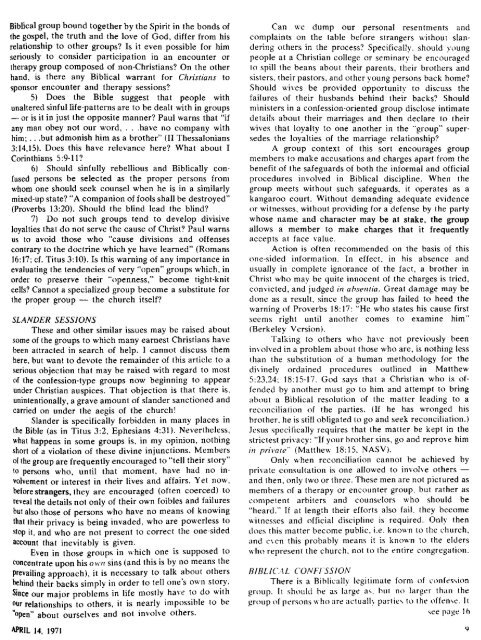Covenanter Witness Vol. 86 - Rparchives.org
Covenanter Witness Vol. 86 - Rparchives.org
Covenanter Witness Vol. 86 - Rparchives.org
Create successful ePaper yourself
Turn your PDF publications into a flip-book with our unique Google optimized e-Paper software.
Biblical group bound together by the Spirit in the bonds ofthe gospel, the truth and the love of God, differ from hisrelationship to other groups? Is it even possible for himseriously to consider participation in an encounter ortherapy group composed of non-Christians? On the otherhand, is there any Biblical warrant for Christians tosponsor encounter and therapy sessions?5) Does the Bible suggest that people withunaltered sinful life-patterns are to be dealt with in groups— or is it in just the opposite manner? Paul warns that "ifany man obey not our word, . . .have no company withhim; . . .but admonish him as a brother" (II Thessalonians3:14,15). Does this have relevance here? What about ICorinthians 5:9-11?6) Should sinfully rebellious and Biblically confusedpersons be selected as the proper persons fromwhom one should seek counsel when he is in a similarlymixed-up state? "A companion of fools shall be destroyed"(Proverbs 13:20). Should the blind lead the blind?7) Do not such groups tend to develop divisiveloyalties that do not serve the cause of Christ? Paul warnsus to avoid those who "cause divisions and offensescontrary to the doctrine which ye have learned" (Romans16:17; cf. Titus 3:10). Is this warning of any importance inevaluating the tendencies of very "open" groups which, inorder to preserve their "openness," become tight-knitcells? Cannot a specialized group become a substitute forthe proper group — the church itself?SLANDER SESSIONSThese and other similar issues may be raised aboutsome of the groups to which many earnest Christians havebeen attracted in search of help. I cannot discuss themhere, but want to devote the remainder of this article to aserious objection that may be raised with regard to mostof the confession-type groups now beginning to appearunder Christian auspices. That objection is that there is,unintentionally, a grave amount of slander sanctioned andcarried on under the aegis of the church!Slander is specifically forbidden in many places inthe Bible (as in Titus 3:2, Ephesians 4:31). Nevertheless,what happens in some groups is, in my opinion, nothingshort of a violation of these divine injunctions. Membersof the group are frequently encouraged to "tell their story"to persons who, until that moment, have had no involvementor interest in their lives and affairs. Yet now,before strangers, they are encouraged (often coerced) toreveal the details not only of their own foibles and failureshut also those of persons who have no means of knowingthat their privacy is being invaded, who are powerless tostop it, and who are not present to correct the one-sidedaccount that inevitably is given.Even in those groups in which one is supposed toconcentrate upon his own sins (and this is by no means theprevailing approach), it is necessary to talk about othersbehind their backs simply in order to tell one's own story.Since our major problems in life mostly have to do with°ur relationships to others, it is nearly impossible to be"°pen" about ourselves and not involve others.Can we dump our personal resentments andcomplaints on the table before strangers without slanderingothers in the process? Specifically, should youngpeople at a Christian college or seminary be encouragedto spill the beans about their parents, their brothers andsisters, their pastors, and other young persons back home?Should wives be provided opportunity to discuss thefailures of their husbands behind their backs? Shouldministers in a confession-oriented group disclose intimatedetails about their marriages and then declare to theirwives that loyalty to one another in the "group" supersedesthe loyalties of the marriage relationship?A group context of this sort encourages groupmembers to make accusations and charges apart from thebenefit of the safeguards of both the informal and officialprocedures involved in Biblical discipline. When thegroup meets without such safeguards, it operates as akangaroo court. Without demanding adequate evidenceor witnesses, without providing for a defense by the partywhose name and character may be at stake, the groupallows a member to make charges that it frequentlyaccepts at face value.Action is often recommended on the basis of thisone-sided information, fn effect, in his absence andusually in complete ignorance of the fact, a brother inChrist who may be quite innocent of the charges is tried,convicted, and judged in absentia. Great damage may bedone as a result, since the group has failed to heed thewarning of Proverbs 18:17: "He who states his cause firstseems right until another comes to examine him"(Berkeley Version).Talking to others who have not previously beeninvolved in a problem about those who are, is nothing lessthan the substitution of a human methodology for thedivinely ordained procedures outlined in Matthew5:23,24; 18:15-17. God says that a Christian who is offendedby another must go to him and attempt to bringabout a Biblical resolution of the matter leading to areconciliation of the parties. (If he has wronged hisbrother, he is still obligated to go and seek reconciliation.)Jesus specifically requires that the matter be kept in thestrictest privacy: "If your brother sins, go and reprove himin private" (Matthew 18:15, NASV).Only when reconciliation cannot be achieved byprivate consultation is one allowed to involve others —and then, only two or three. These men are not pictured asmembers of a therapy or encounter group, but rather ascompetent arbiters and counselors who should be"heard." If at length their efforts also fail, they becomewitnesses and official discipline is required. Only thendoes this matter become public, i.e. known to the church,and e\en this probably means it is known to the elderswho represent the church, not to the entire congregation.BIBLICAL CONFESSIONThere is a Biblically legitimate form of confessiongroup, ft should be as large as, but no larger than Ihegroup of persons who are actualK parties to the offense. Itsee page 16APRIL 14, 1971 9
















